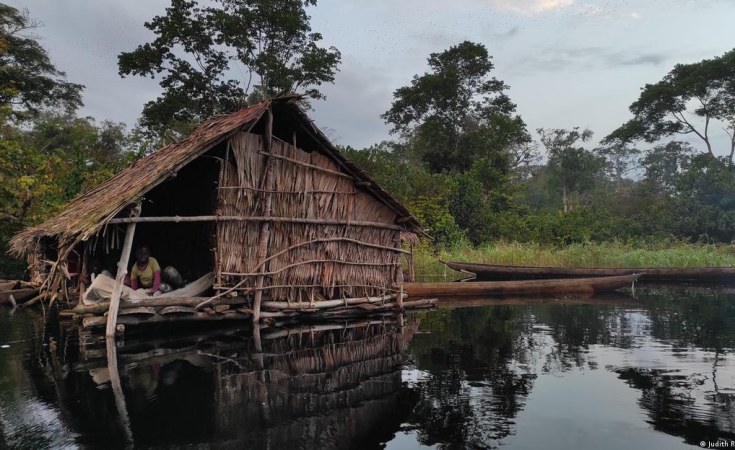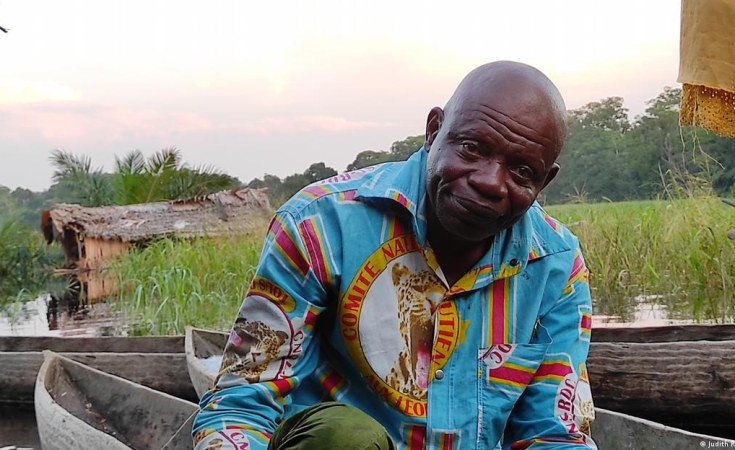The Democratic Republic of Congo wants more money for climate projects. Otherwise, oil drilling could replace fishermen in the world's largest peat bog. And that could spell devastation for the environment.
In the tiny village of Mpeka, hidden deep in the rainforest of the Democratic Republic of Congo (DRC), fisherman Jean Paul Ikolongo sits on a plastic chair in his hut. He seems pensive.
Politicians from the faraway capital, Kinshasa, have recently paid him a visit, encouraging him to abandon Mpeka so that companies could explore the area for oil.
But foreign researchers from further afield also stopped by Ikolongo's village urging him to stay in Mpeka and look after the trees.
He does not know who to believe, or who to trust.
Ikolongo's village is in northwestern DRC, east of the mighty Congo river, next to a smaller tributary called the Ruki.
Mpeka is so small and covered in greenery that satellite images barely pick it up.
Under Mpeka sits an unusual treasure: The world's biggest tropical peat bog.
Eyeing new oil wealth
The bog -- which is half the size of Germany -- stores 29 billion tons of carbon dioxide, according to researchers from universities in Kisangani, Leeds and London.
They found that, if such a massive amount of carbon were to be released, it would equal all fossil fuel emissions worldwide for three years!
To help efforts against global warming, this peat bog -- hidden deep in the Congolese jungle -- must remain intact.
But the Congolese government has other ideas. In July 2022, it held an auction for 27 oil blocks, three of which are located in the peatlands.
An estimated 22 billion barrels of oil are said to be there, which would result in a potential billion-dollar industry for the DRC.
Back in Mpeka, the men from Kinshasa told Ikolongo that Mpeka's 1,000 residents must leave when the oil companies arrive. The men promised that, in return for leaving, the government would build them nice homes somewhere.
The new oil wealth would be more than enough to fund new schools, streets and hospitals across the country.

Lower fish yields in Congolese rivers
For Ikolongo, that promise is tempting.
"I'm old, and I need a good home," says Ikolongo.
As the 60-year-old fisherman sits in his hut, water washes over his feet. It's the rainy season, and almost all the huts next to the Ruki river are flooded.
Ikolongo walks on planks in his own home to escape the rising water. Around his hut, Ikolongo can only see water. There is limited infrastructure or sewage treatment, so the river is used for bathing, laundry, dish washing -- and as toilet.
It's a breeding ground for cholera. Ikolongo wonders whether things would be better if he moved away.
But researchers from the United Kingdom also came to Mpeka. They told Ikolongo that climate change is at fault for smaller catches of fish.
They led him to believe that if he were to stay and protects the peat, all will be well.
Yet, the researchers managed to annoy Ikolongo's 38-year-old son, Dieumerci Bisalo, because they banned him from cutting trees, leaving him to wonder how he would manage without firewood.
'Keep the lungs of the Earth!'
Western donors would rather not sponsor oil exploration, and because the Congolese rainforest absorbs more Greenhouse gases than Brazil, rich countries finance projects as part of the Central African Forest Initiative (CAFI).
Germany has recently donated Ꞓ125 million (around $132 million) to CAFI and will support the peat bog where Mpeka is situated with an additional Ꞓ15 million over six years. But the funding comes with a caveat: If the DRC were to extract oil in the rainforest, that would "inevitably" impact funding for conservation areas, according to a spokesperson for the Ministry for Economic Cooperation and Development in Berlin.
Congolese historian Aloys Tegera believes this arrangement is arrogant because the major polluters in the Global North became wealthy through fossil fuel extraction.
"And now they are telling us to keep the lungs of the world intact!" he glowers. If the Congo avoids extracting oil, and 90 million residents may not use wood for cooking, then the country should be compensated, he says.

Rene Ngongo agrees. In 2009, the 60-year-old biologist was awarded the Right Livelihood Award (also known as the Alternative Nobel Prize) because of his commitment to fighting for nature conservation in the DRC.
Now, though, he works for a government-affiliated think tank in Kinshasa. He is quick to point out that at the 2015 Climate Conference in Paris (COP21), industrialized nations promised to pay poorer countries $100 billion per year to soften the blow of climate change. But that's not enough, and often remains an empty promise, he says.
Rainforest country alliance
Instead, Ngongo has more optimism for an alliance formed by Congo, Brazil and Indonesia at the 2022 Climate Change Conference in Sharm-el-Sheik (COP27).
The countries with the biggest rainforests want to negotiate a budget with industrialized nations. Ngongo suggests a type of "Rainforest-OPEC", following the example of the powerful Organization of the Petroleum Exporting Countries.
The environmentalist has even become a fan of the oil business.
"We need money to alleviate poverty," he explains.
Raoul Monsembula shakes his head at this idea. The 57-year-old biologist works for Greenpeace and says valuable mineral resources such as coltan and cobalt have been exported for decades, but the people in Congo are still among the poorest in the world.
"Even if oil were to be extracted throughout the Congo, the population would gain nothing from it," he says with conviction.
Conservation areas at risk
Greenpeace accuses the DRC's Minister of Hydrocarbons Didier Budimbu Ntubuanga of not being transparent, accusing him of reserving two oil blocks for a business partner.
The environmentalists want the oil auction be stopped, because drilling would put 6% of the rainforest and the peatland in danger.
Additionally, nine of the 27 blocks would be in or near conservation areas, Greenpeace has claimed.
While environmentalists and politicians argue, fisherman Ikolongo sits in his hut in Mpeka and wonders how things will go on for him and his 16 children. When he was young, he was always full and content, he says.
Now he is suffering.
"It breaks my heart when I think of my children's future," he says.
This article was originally written in German.


